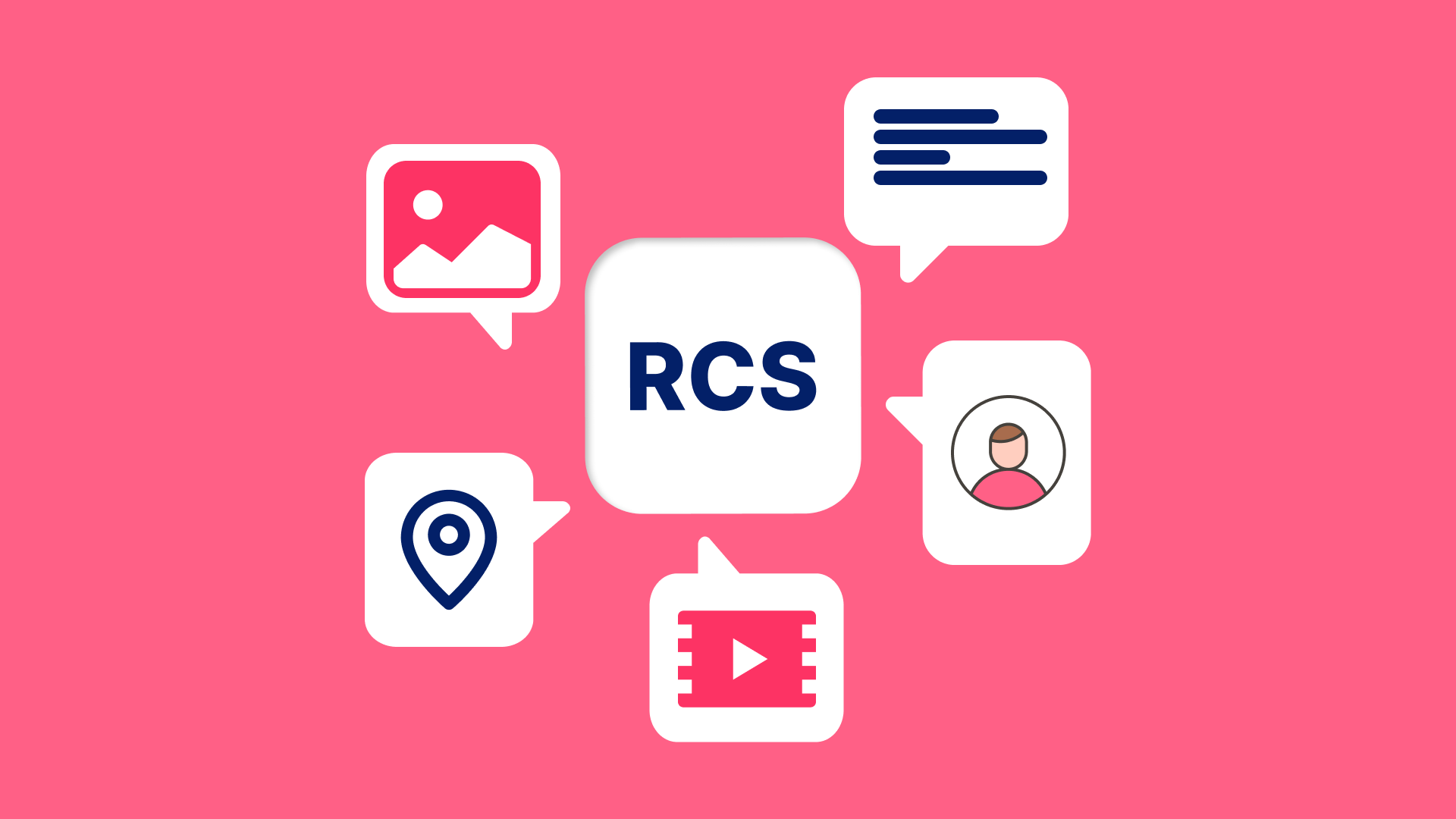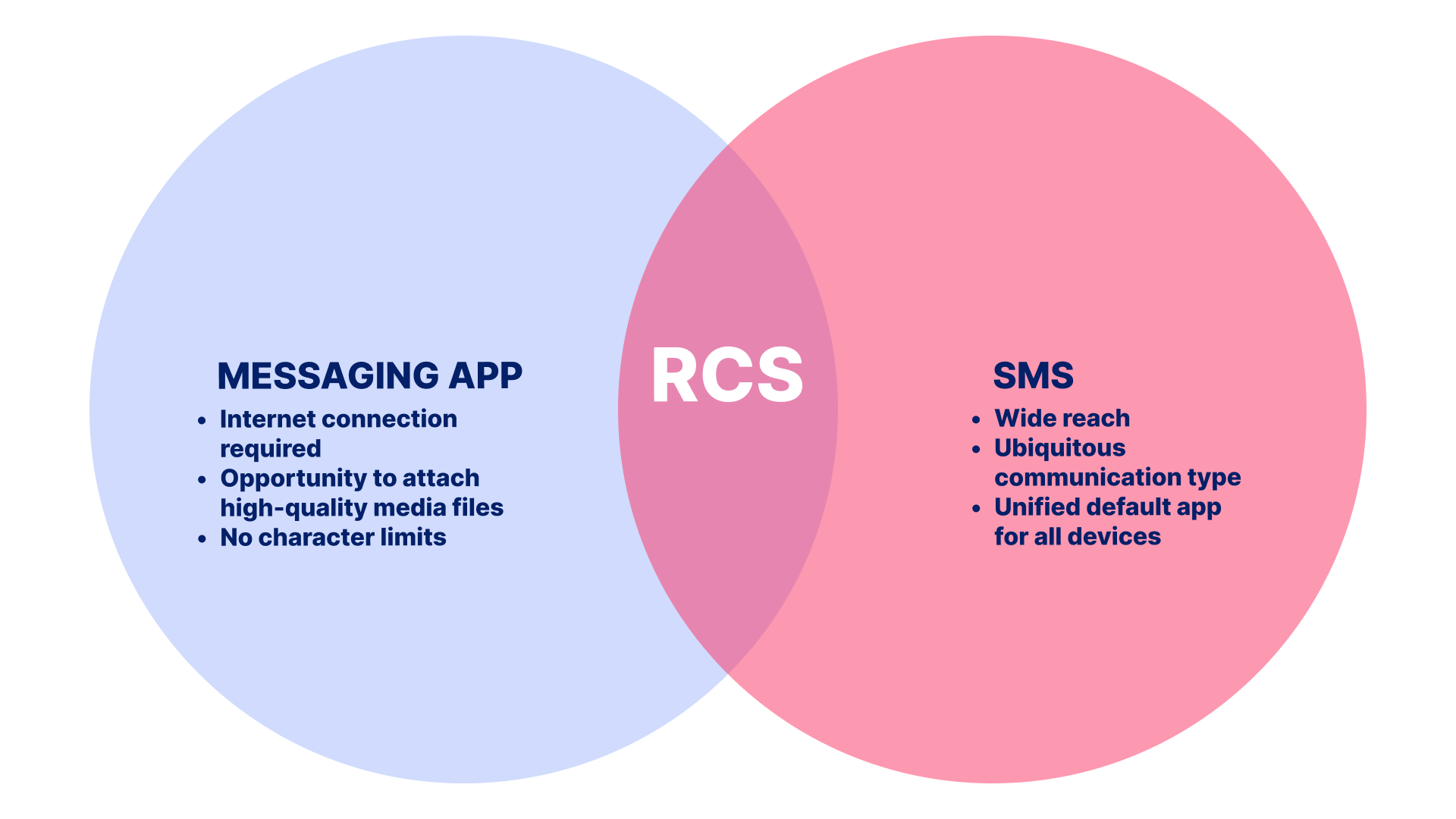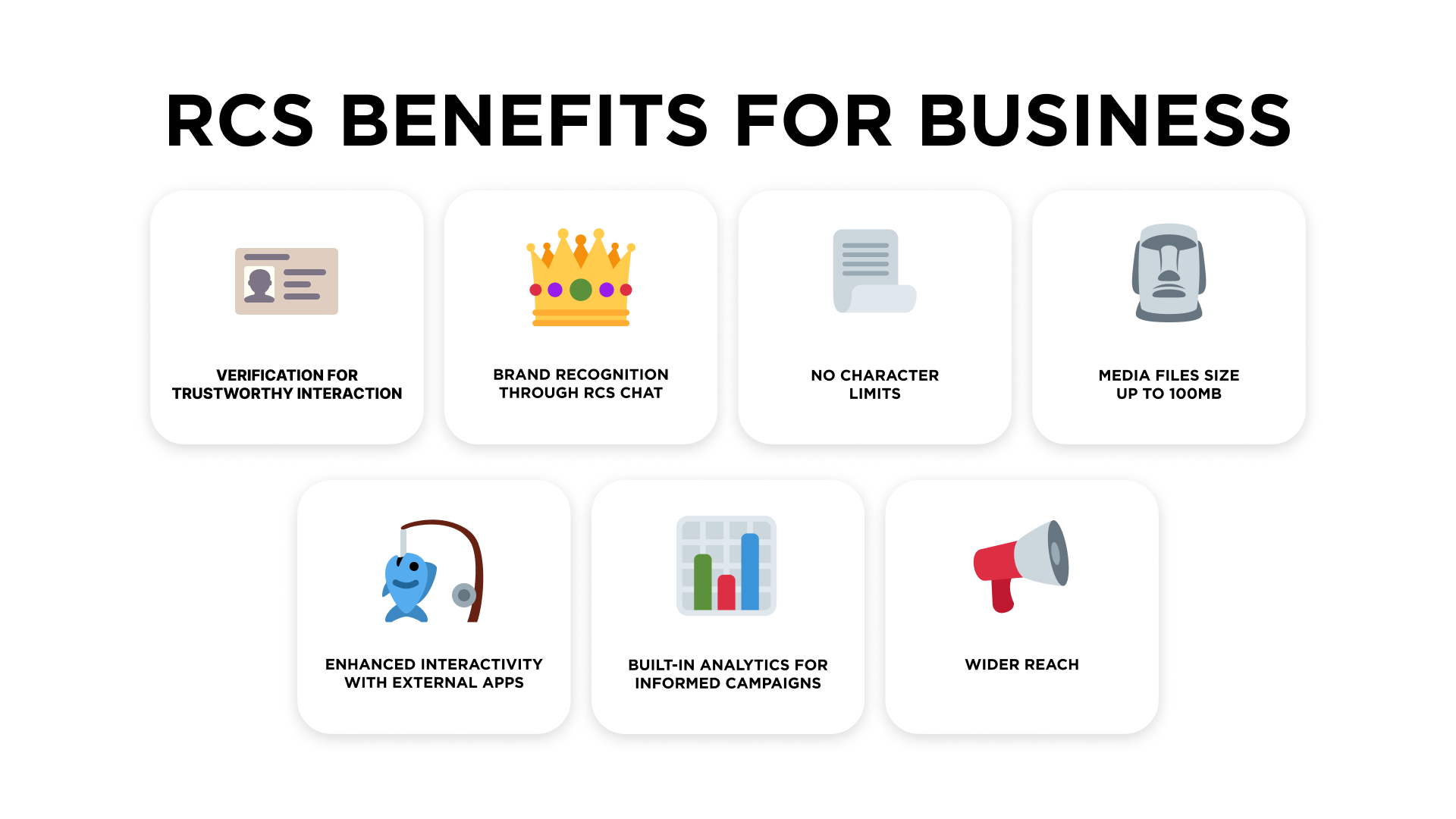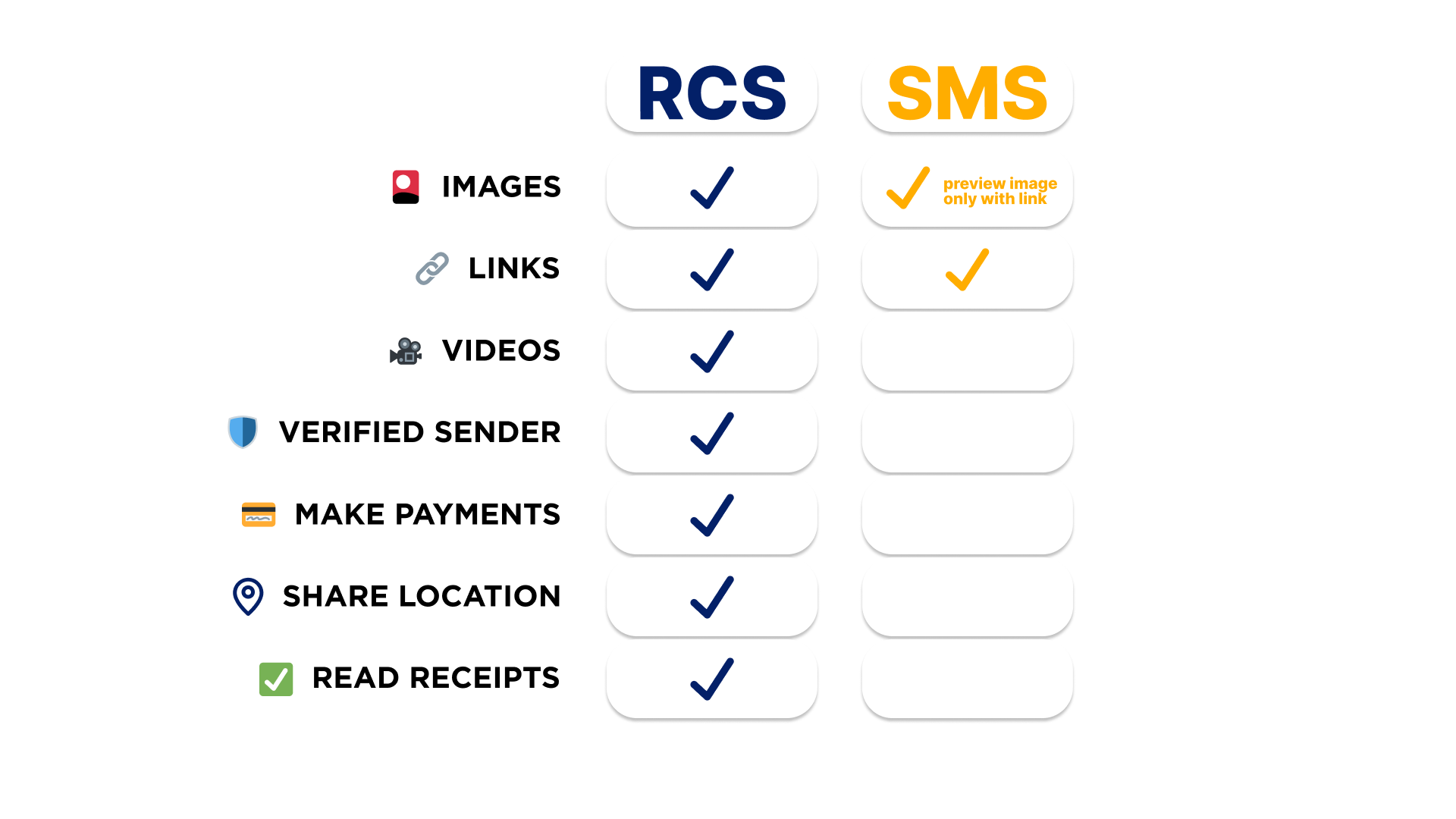Exploring RCS Messaging: Features, Benefits, And Comparison to SMS
Investigating Rich Communication Services messaging, its business advantages, security aspects, and how it differ from SMS.

Rich Communication Services messaging was built in 2008 and is intended to replace SMS and MMS messaging. Despite not achieving the same level of ubiquity as mainstream messaging apps or SMS, RCS has quietly evolved over the years, incorporating features such as enhanced media sharing, read receipts, and interactive content, thereby influencing the messaging landscape.
This article aims to explore the lasting benefits of RCS, including streamlined multimedia sharing and improved group chats, contributing to a refined communication experience. We take a look at the continued evolution and relevance of RCS, delivering valuable context for companies and users navigating the diverse array of messaging options available today.
Table of contents
What is RCS messaging?
Rich Communication Services, or RCS messaging, is a communication protocol introduced as a successor to traditional SMS and MMS messaging. RCS operates on an internet connection, enabling users to send messages over data networks instead of relying solely on traditional cellular networks.The difference between Rich Communication Services and messengers is that RCS does not require the installation of any external apps. Smartphone owners can use this option in standard apps just like SMS.
Opposed to SMS or MMS messaging, RCS makes it possible to include high-quality media content, geolocations, buttons, and other elements in messages. All of these can boost the informativeness and general attractiveness of an RCS message, meaning it becomes more than just a communication option, but a valuable tool for businesses.

RCS messaging history
The inception of RCS messaging can be traced back to the Rich Communication Suite industry initiative, which was formed in 2007 through collaboration among industry promoters. By February 2008, the GSM Association officially took on the role of RCS project home, marking a significant milestone.
In a pivotal move, the GSM Association published the Universal Profile in November 2016. This singular GSMA specification became a cornerstone for advanced communications, unifying standards and fostering interoperability among diverse stakeholders. By early 2017, 47 mobile network operators, 11 manufacturers, and 2 OS providers (Google and Microsoft) had announced their support for the Universal Profile, signifying widespread industry backing.
Samsung emerged as a trailblazer among device manufacturers, with RCS capability integrated into its devices in 2012 in Europe and 2015 in the United States. The company played a pivotal role in shaping the early landscape of RCS adoption.
In April 2018, Google signaled a strategic shift by transferring its Google Allo messaging service team to focus on a broader RCS implementation. By June 2019, Google initiated the deployment of RCS on an opt-in basis via the Messages app. This deployment adhered to the Universal Profile and was hosted by Google, bypassing carrier dependencies if RCS service was not provided by the carrier.
One more significant move came in June 2021 when Google introduced end-to-end encryption to its Messages app, using the Signal Protocol as the default option for one-on-one RCS conversations. By December 2022, end-to-end encryption extended to group chats in the Google Messages app for beta users, reaching all users by August 2023. Furthermore, Google took a proactive stance by enabling RCS in Messages by default, encouraging widespread adoption of end-to-end encryption.
November 2023 brought news that Apple plans to introduce RCS support in 2024. In a noteworthy decision, Apple expressed its commitment to working with GSMA to develop an RCS encryption standard, signaling a collaborative approach to security in the evolving Rich Communication Services messaging.
Enhancing business communication with RCS messaging
RCS gives more communication opportunities compared to SMS or MMS messaging so for businesses, Rich Communication Services tools become a valuable communication channel along with popular messengers. Let’s take a closer look at the advantages of RCS for business.

Verification for trustworthy interaction
A fundamental advantage of RCS for businesses is the requirement for verified company identities. This verification process ensures that only legitimate companies can use RCS, fostering an environment where users can engage without fear of spam or scams. This commitment to authenticity not only builds trust but also enhances the overall user experience.
Brand recognition through RCS chat
RCS supports brand names and brand colors, allowing businesses to maintain a consistent and recognizable brand presence in their communication. This branding capability within RCS chats not only reinforces brand identity but also creates a visually cohesive experience for users interacting with company messages.
Beyond character limits
Unlike traditional SMS, RCS liberates businesses from the confines of a 160-character limit. This freedom allows companies to convey more detailed and nuanced messages to their audience, providing richer and more informative content without the need for message segmentation.
Media files size up to 100MB
RCS further distinguishes itself from its predecessor, MMS, by offering more flexibility in media file sizes. Companies can now attach high-quality visual content without strict size limitations up to 1MB, enabling the seamless sharing of engaging images, videos, and audio files within messages.
Enhanced interactivity with external apps
RCS opens up new avenues for businesses to create engaging messages by facilitating interactions with external apps. Whether integrating browsers, maps, or other applications, companies can craft dynamic and interactive messages that offer users a more immersive and personalized experience.
Built-in analytics for informed campaigns
RCS comes equipped with built-in analytics, providing businesses with valuable insights into their messaging campaigns. Features like delivery receipts, open rates, and read rates enable companies to gauge the effectiveness of their messages. This data-driven approach allows for the personalization of content, making campaigns more efficient and responsive to user preferences.
Wider reach
There is one more reason why RCS is worth business owners’ attention. Various users have different preferences in communication: some of them use WhatsApp, others prefer Telegram or email. It causes the necessity of using an omnichannel solution such as Umnico Inbox to manage all the incoming users’ requests with less effort. As for Rich Communication Services, they can become an excellent solution for outgoing messages, as they work as SMS. The point is, that some users don’t have particular messengers but all the phones support SMS so if a business launches an RCS campaign, it will reach all the audience at once. Even if a recipient’s phone does not support RCS, a user will still receive the message as an SMS.
RCS vs. SMS: Convenience and efficiency
Though SMS is still more familiar to most users and therefore more commonly used, there are some points showing that Rich Communication Services chats give more communication options. Let’s delve into the key aspects that distinguish RCS from SMS and underscore its advantages:
1. Authentication and trust
- SMS messages lack a built-in verification system, leaving users susceptible to spam and phishing attempts.
- With RCS, only verified companies can engage in messaging, fostering a secure environment free from concerns about unsolicited messages. This authentication feature contributes to a trustworthy and reliable communication channel.
2. Visual appeal and branding
- Traditional SMS is limited to plain text, it does not offer even minimal opportunities for visual engagement or branding.
- RCS chat supports brand names, colors, and multimedia elements, allowing businesses to create visually appealing messages. This branding capability not only enhances the user experience but also reinforces brand recognition.
3. Character limitations
- SMS messages are restricted to 160 characters, leading to fragmented and often incomplete communications.
- RCS liberates businesses from character constraints, enabling the seamless delivery of detailed and comprehensive messages. This flexibility facilitates clearer communication and eliminates the need for message segmentation.
4. Media files flexibility
- SMS chats don’t support media files at all, and MMS come with strict size limitations, hindering the quality and variety of content that can be shared.
- In contrast, RCS allows for the attachment of high-quality media files with size limits of up to 100MB. This flexibility enhances the richness of multimedia content shared within messages.
5. Interactivity with various apps
- SMS cannot integrate external applications for interactive content.
- RCS facilitates interactions with external apps, such as browsers and maps, allowing businesses to create dynamic and engaging messages. This functionality opens up new possibilities for user engagement within the messaging platform.
6. Analytics
- Traditional SMS lacks detailed analytics, making it challenging for businesses to evaluate the effectiveness of their campaigns.
- RCS comes with built-in analytics, offering insights into delivery receipts, open rates, and read rates. This valuable data empowers businesses to refine their messaging strategies and personalize content for better campaign efficiency.

Can RCS replace messaging apps?
Considering whether Rich Communication Services can replace messaging apps involves examining various factors.
- Universal adoption. RCS is embedded in Android’s native messaging app but faces challenges in achieving universal acceptance like standalone messaging apps.
- Cross-platform compatibility. Messaging apps often support cross-platform use, a feature RCS is still developing, mainly tied to Android devices.
- Feature depth. Standalone messaging apps offer a wide array of features. Some of them, such as voice and video calls, potentially surpass RCS’s capabilities.
- Mobile operator support. The ability of RCS strongly depends on the user’s mobile operator. However, the most popular operators all over the world support Rich Communication Services.
- User habit and loyalty. Users are deeply ingrained in their messaging app habits, and switching platforms can be challenging, impacting RCS’s potential adoption.
Thus, while RCS enhances traditional SMS, it currently serves as a complement rather than a direct replacement for standalone messaging apps. The established dominance, feature richness, and user loyalty to popular messaging apps pose challenges to RCS becoming a universal substitute. However, as RCS evolves, its impact on the mobile communication landscape remains a dynamic aspect to watch.
The security aspects of RCS
Rich Communication Services not only brings advanced features to messaging but also addresses critical security considerations. We have already mentioned the most important of them: end-to-end encryption and verification for companies.
- End-to-end encryption. RCS introduces end-to-end encryption for one-on-one conversations as well as for group chats, meaning that no one can access messages except the conversation participants. This feature aligns RCS with the growing emphasis on secure messaging ensuring the privacy of user communications.
- Verified company identities. Only verified companies can utilize RCS, mitigating the risk of spam and ensuring users interact with legitimate entities. This verification process enhances overall security and trust.
As RCS evolves, its commitment to robust security features positions it as a secure and reliable platform for modern communication, addressing concerns that are considerable in today’s digital landscape.
Summing up
At the moment, Rich Communication Services is a promising communication channel. For today, it may be an option for users, but for businesses, RCS is already a solution to increase reach using opportunities of SMS and make messages more engaging with the capabilities of messaging apps.
As businesses embrace RCS messaging, they enter a realm of advanced communication that not only prioritizes user trust and engagement but also offers unparalleled flexibility and insights. Verified identities, brand recognition, expanded character limits, extended media file sizes, enhanced interactivity, and built-in analytics collectively position RCS as a powerful tool for businesses looking to elevate their messaging strategies and connect more meaningfully with their audience.
Staying up-to-date with customer communication trends in our dynamic world is crucial. Subscribe to the Umnico blog to always have your finger on the pulse.

Subscribe to Umnico news!
Be the first to get recommendations and up-to-date information
